British Tunisia death toll rises to 15
- Published
Orla Guerin reports on what is known about some of those killed
Fifteen Britons have died following the attack on a Tunisian beach resort, the Foreign Office has confirmed.
But Foreign Office minister Tobias Ellwood warned the death toll was likely to rise.
He said it was "the most significant terrorist attack on British people" since 52 people were killed in the London 7/7 bombings in 2005.
A Tunisian student linked to Islamic State carried out the gun attack on a beach near Sousse which killed 38.
None of the identities of the British fatalities has been officially released.
But the names of some of those who have died or were injured have been confirmed locally.
Carly Lovett, 24, from Gainsborough in Lincolnshire, Lisa Burbidge, in her 60s, from Tyne and Wear, Adrian Evans, 44, from the West Midlands and his 22-year-old nephew Joel Richards, and Bruce Wilkinson, 72, from Goole in Yorkshire are among the dead, according to sources.
Couple Sue Davey and Scott Chalkley, 42, was also killed, according to their respective sons. Ms Davey's son Conor Fulford and Mr Chalkley's son Ross Naylor both confirmed the deaths on Twitter, where they had made appeals to find them after the attack.
An Irish national was also among the dead. She was named locally as Lorna Carty, who was in her 50s and from Robinstown in County Meath.
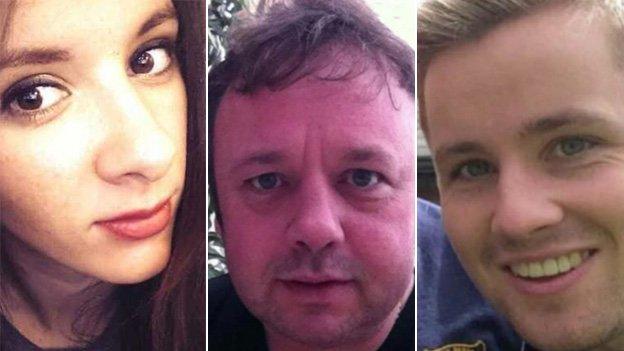
Among the dead are (l-r) Carly Lovett, Adrian Evans and Joel Richards
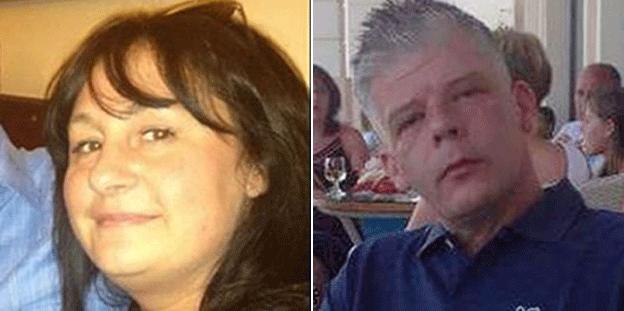
Sue Davey and Scott Chalkley's sons confirmed the couple's deaths
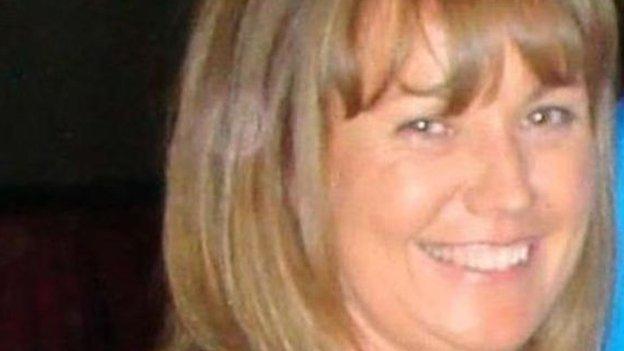
Lorna Carty, from County Meath, was named locally as being among the dead
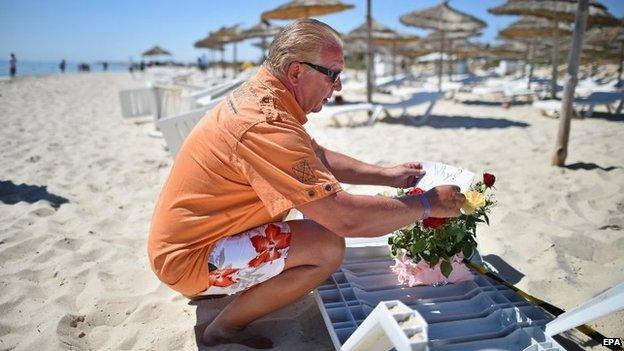
People have been laying floral tributes on the beach at Sousse
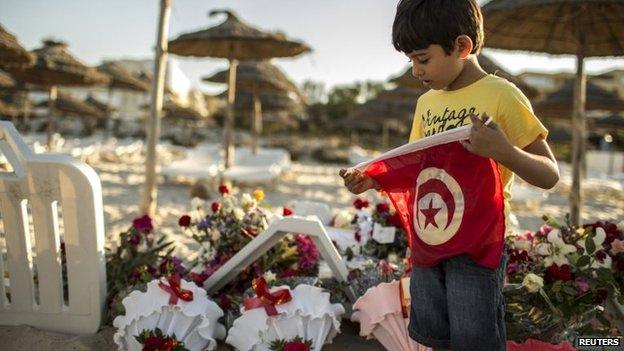
German, Belgian and Tunisian citizens are also thought to have been killed in the attack
The Tunisian authorities said one Belgian and one German citizen had been identified among the dead, while Tunisians and French are also thought to have been victims.
Mr Ellwood said the death toll was likely to rise because several people had been "seriously injured in this horrific attack".
Prime Minister David Cameron called the attack on the beach "savage".
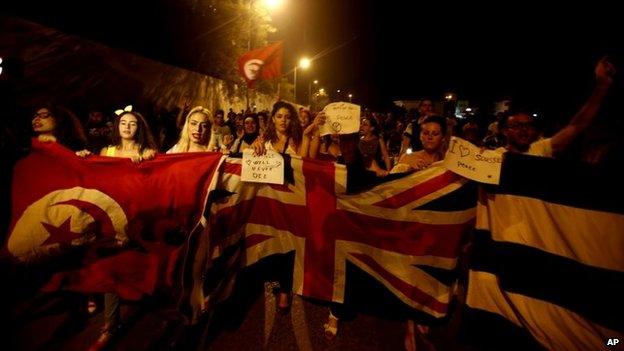
People shouted "Peace" and "Sousse will never die" during a protest against terrorism
People gathered in Sousse on Saturday night for a protest against terrorism.
Crowds gathered after dark with some holding candles and others carrying flags, including those of the UK and Tunisia.
Gunman's family held
The attack started at about noon on Friday when the gunman, who security officials said had posed as a swimmer but was carrying a rifle under a parasol, started shooting on the beach - near the Hotel Riu Imperial Marhaba and the Bellevue Hotel - before entering the Hotel Imperial Marhaba, continuing to shoot.

The gunman - named later as Seifeddine Rezgui, a student not previously known to authorities - was then shot dead by police. Islamic State, which said it was behind the attack, named him as Abu Yahya al-Qayrawani.
The BBC's Jim Muir, who is in the gunman's home village of Jaafour, said his parents, sister and close friends had been detained by the Tunisian authorities.
But he spoke to an uncle and cousin of the man who said there had been nothing in his behaviour to indicate he had been radicalised or that he was about to carry out an attack.
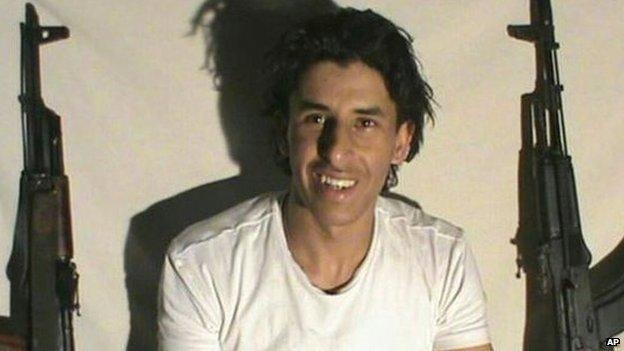
An image published on sites associated with Islamic State purported to show the Tunisian gunman
The Foreign Office in its latest travel advice, external said anyone in the area should keep in touch with their tour operator and follow any advice from Tunisian security authorities.
And it warned that further terrorist attacks in Tunisia, including in resort areas, were possible, "including by individuals who are unknown to the authorities and whose actions are inspired by terrorist groups via social media".
'No pulse'
Tony Callaghan, 52, from Norfolk and his wife Chris survived Friday's attack but were both taken to hospital with gunshot wounds.
Mr Callaghan described the horrific scene inside the hotel.
"I looked down the corridor and there were at least two other females who were dead, they had been shot," he said.
"One of the little offices that went out to the right, there was a young guy in there who was sat on a chair.
"And his girlfriend was dead next to him in the office and he was holding her hand. And he said, what do I do?... I pulled him out the way and I checked for a pulse. And there was no pulse.
"He said 'We're getting married in two weeks time'. And she was dead."
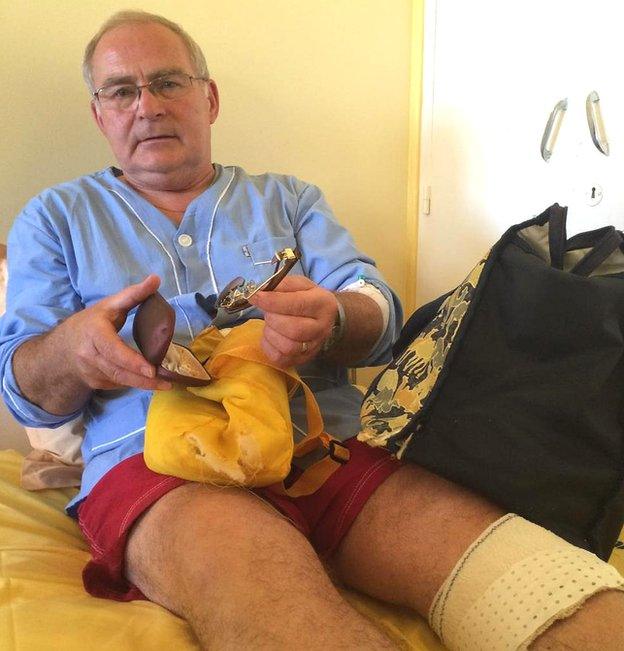
Tony Callaghan shows his wife's glasses case and bag covered in bullet holes
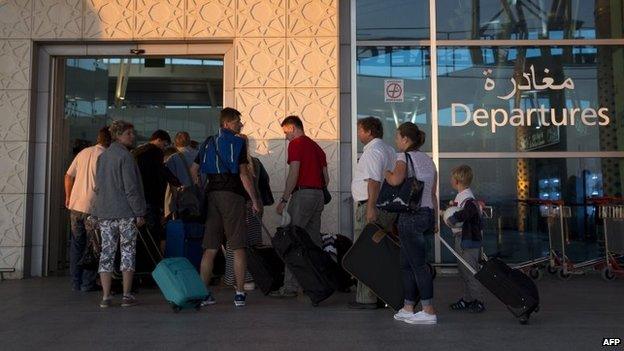
Tourists have been leaving Tunisia following the attack
A number of Britons have issued desperate pleas for information about relatives who have not made contact since the attack.
Daniel Welch, from Swindon in Wiltshire, said he had not heard from his grandfather John Welch, 74 and his partner Eileen Swannack, 70 since then.
"We are at a bit of a loss and we can only expect the worst," Mr Welch said.
The family of missing couple Denis and Elaine Thwaites from Blackpool had been told they were alive but injured and in a Tunisian hospital - but they later said this was misinformation.
'Frantic' relatives
Son-in-law Daniel Clifford said: "We are now back to square one and fearing the worst.
"We are thinking of flying out there because we can't get anything out of the Foreign Office. We just need to know. We are absolutely frantic."
Meanwhile, Carol Mulhall from Doncaster, who was looking for her mother and stepfather Margaret and Dougie Lamb - and made a number of appeals for information during the day - finally received good news.
After photos of them were shown on the BBC someone at the British embassy in Tunisia recognised the couple and made contact with Ms Mulhall via Facebook.
She said: "I have never felt so thankful for anything in my life."

At the scene
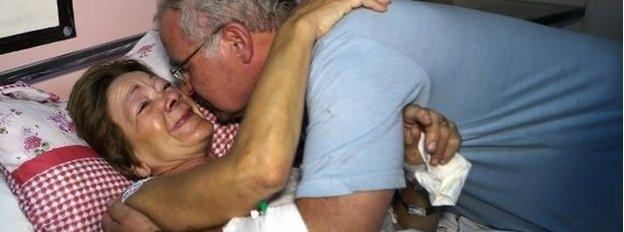
Briton Chris Callaghan (left), 62, who survived the attack, with her husband Tony at a Sousse hospital
By Mark Lowen, BBC News in Sousse
The clinics of Sousse aren't used to dealing with gunshot wounds. A quiet tourist town, it's been severely shaken by this tragedy.
At the Sahloul University hospital, they're taking in the victims.
Over 20 are being treated here: one is in intensive care, others waiting for operations on limbs punctured by bullets.
Tony Callaghan, from Norfolk, was at the Imperial Hotel with his wife - their third time here. The attack sent him running from the beach into the hotel, crying out for his wife to take cover.
One bullet hit his knee. He ended up with a group in one room, barricading themselves in. He could hear his wife outside crying for help. Welling up with tears, he tells me he didn't know if he'd see her alive.
But then he holds up her bag, with her glasses case inside. Both bear bullet holes, the lens of the glasses shattered.
The bag took the impact of the bullet which then hit her leg. And she too waits, upstairs at the Sahloul hospital, not knowing when she and her husband will get home.

Thomson and First Choice have sent extra planes to bring home thousands of tourists from the area.
As of Saturday they had expatriated 1,000 customers but said there were still 5,400 still in Tunisia.
Thomson and First Choice's helpline number is 0800 088 5372.
Britons are waiting to board a specially chartered flight to Manchester, as Mark Lowen reports
A UK police team is on its way to the country to assist with identifying victims and Foreign Office staff are also in the area.
Hamish Cowell, the UK's ambassador to Tunisia, said the teams had been "working around the clock" to help the injured, bereaved and those who wanted to leave. He urged anyone needing help to contact the Foreign Office helpline, which is 0207 008 0000.
Travel developments
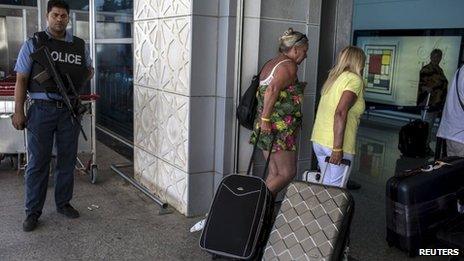
All Thomson and First Choice holidays to Tunisia for the next week have been cancelled
Flights are continuing to take holidaymakers back to the UK, with 12 scheduled to leave Tunisia on Sunday
Easyjet said it would provide an additional flight from Monastir, Tunisia, at 17:45 GMT (18:45 BST) for customers who wish to fly home
early.Jet2holidays and Jet2.com travel companies put on four aircraft from Enfhida Airport on Saturday afternoon to repatriate those who wanted to return home and has cancelled all of its flights and holidays to Tunisia up to 5 July
